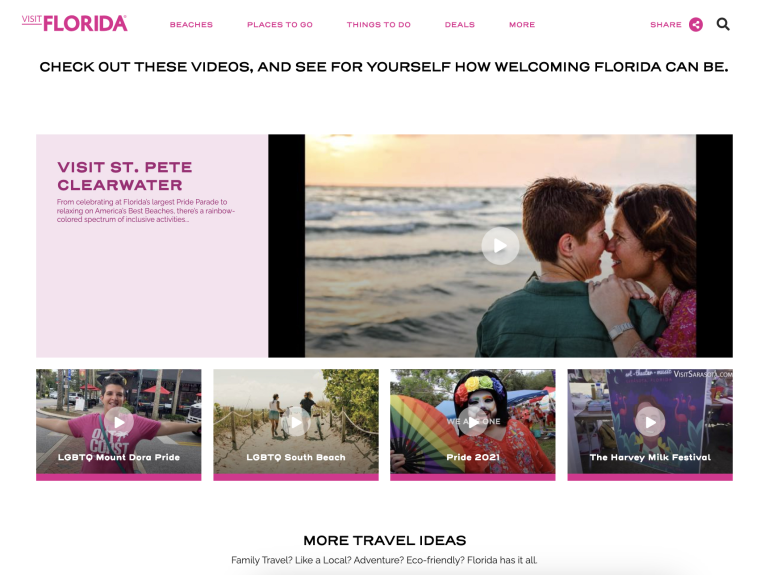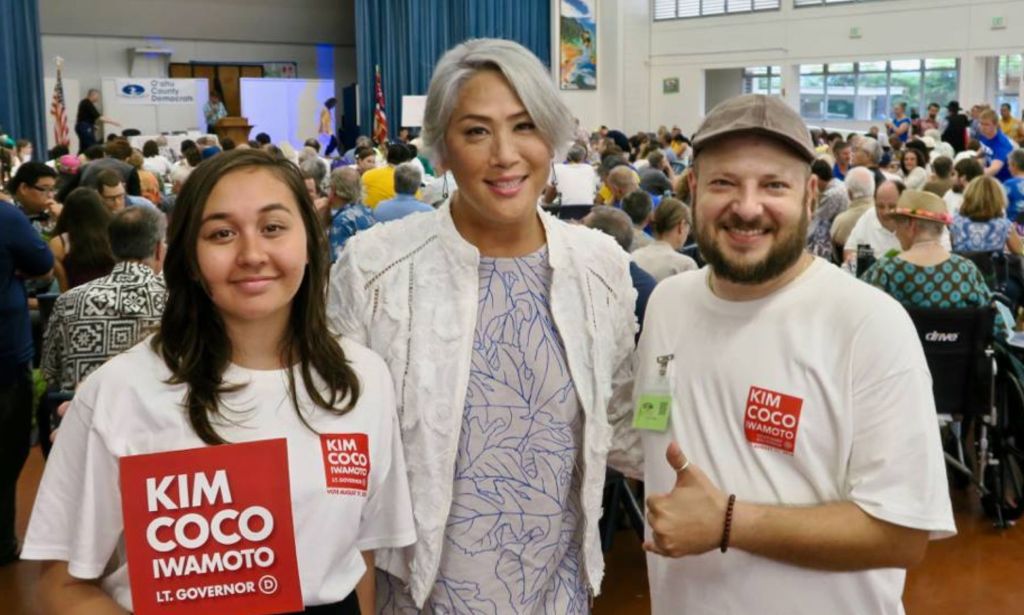Rep. Robert Garcia believes “radical” queerness & compassion can help win the 2024 election
Rep. Robert Garcia (D-CA) understands the stakes of the upcoming election. He immigrated to the U.S. at age 5, became a U.S. citizen in his early 20s, tackled the COVID-19 epidemic as the youngest and first out LGBTQ+ mayor of Long Beach, California, and—after the virus killed both his mother and stepfather—became the first out gay immigrant ever elected to Congress. Now Garcia is surrounded by some Republican legislators who believe COVID-19 was a hoax, immigrants are “poisoning the blood of our country,” and that LGBTQ+ people don’t deserve legal protections.
About a month ago, Garcia was all in on the campaign to re-elect President Joe Biden. He supported Biden’s 2020 campaign as one of the first out LGBTQ+ people to deliver a keynote address at the Democratic National Convention. In April, he helped launch a national initiative focused on rallying LGBTQ+ voters and volunteers behind Biden, and while many Democrats called on Biden to step down following his lackluster June 27 debate performance, Garcia wasn’t among them.
But a lot has changed over the last month. Biden dropped out of the presidential race on July 21 and immediately endorsed Vice President Kamala Harris as his replacement. Garcia quickly expressed his support for Harris — a fellow Californian — noting that he served as her campaign co-chair during her candidacy for president during the 2020 Democratic presidential primary.
Barely two weeks later, Garcia cheered Harris’s selection of Minnesota Gov. Tim Walz (D) as her running mate, calling him “a home run pick” and adding, “He’s a former teacher and veteran and understands Congress. He has a strong record standing up for working families. Let’s go Harris-Walz because we are not going back!”
“It’s sad to see what’s happening in so many states in the South and Texas and so many other places,” Garcia told LGBTQ Nation about the wave of Republican legislation trying to roll back protections for LGBTQ+, reproductive, and immigrant rights. “And it’s really unfortunate that [these places] send representatives to Congress that can really impact all of our rights.”
With a conservative Supreme Court willing to overturn the court’s past decisionsupholding the rights to contraception and same-sex marriage, “We’re in a really dangerous moment for the community,” Garcia said. “Which is why we need to be very honest and focused on pushing really hard, winning the White House, on flipping the house and making sure that we do everything we can organize in these states.”
Luckily, Democratic enthusiasm has skyrocketed since Harris replaced Biden. According to gay election data analyst Nate Silver, Harris currently leads Trump in five critical swing states.
But history shows us that polls are anything but certain. In 2016, data indicated a promising victory for then-presidential nominee Hillary Clinton just before her shocking loss to Trump despite winning the popular vote.
For his next term, Trump has promised to outlaw gender-affirming care for trans youth (with prison time for anyone complicit in the act), deny federal funds to any hospital or doctors that offer gender-affirming care, and roll back all Biden administration policy protecting trans students “on day one” of his presidency. With the aid of the Heritage Foundation’s Project 2025, Trump has also promised a nationwide ban on trans student-athletes, a federal law recognizing only two genders, prosecution of schools with LGBTQ+-inclusive policies, and the end of all diversity, equity, and inclusion programs (DEI) that encourage the inclusion of non-white, women, and queer individuals.
Trump is also targeting undocumented immigrant families, and it’s an issue Garcia cares deeply about. Trump has also promised to conduct the largest domestic deportation of immigrants in American history (including individuals who have “anti-American views,” which is worrying since he considers racial justice and anti-fascist protestors to be “terrorists”); to reinstate his Muslim travel ban; to end the 125-year-old U.S. right to birthright citizenship; and to terminate the Department of Education.
“It’s really important that we tell people that we can’t be hopeless, that we have to fight back, and we can’t just allow them to steamroll us and to take our rights away.”Rep. Robert Garcia
normal
“I have met with folks that are really, really scared,” Garcia said. “I think it’s important to recognize that people are scared, that people are concerned at the same time. I think it’s really important that we tell people that we can’t be hopeless, that we have to fight back, and we can’t just allow them to steamroll us and to take our rights away.”
“It’s really important that we are aggressive and that we fight back, that we bring the fire,” Garcia added. “This is not a moment where we should be, in any way, holding back our punches. We’re going to be punching back really, really hard, and especially when you have nut jobs like Marjorie Taylor Greene and Lauren Boebert who are impacting our community and who… are insulting LGBTQ+ families almost every day in Congress.”
Garcia has exemplified his willingness to fight back against the likes of Trump, Rep. Marjorie Taylor Greene (R-GA), and their ilk in Congress.
He has said that Greene “obviously has no business being in Congress and is completely, in my opinion, a traitor to the country,” noting that she supported the Trump-inspired January 6, 2021, insurrection to stop the certification of the 2020 presidential election. He has called out hypocritical Republicans for ignoring the Trump family’s numerous (and possibly unethical) foreign business deals while Trump was in the White House; he also led efforts to kick out now-former Rep. George Santos (R-NY) for his dishonesty and financial misdealings.
Garcia has compared Trump’s anti-immigration rhetoric to Hitler’s, saying, “His imagery, the way he supports white nationalism, the way he supports white supremacy, and those kinds of comments are completely offensive to immigrants and hopefully to all Americans in this country.”
For Garcia, the fight over immigrant rights remains particularly personal and important. When he was sworn into Congress in January 2023, he swore on a copy of the U.S. Constitution and three meaningful personal items: a photo of his mother and stepfather, who he had recently lost to COVID, his citizenship certificate, and an original 1939 first-issue copy of a Superman comic from the Library of Congress. Superman is himself an immigrant who arrived in the U.S. as a child and fought for “Truth, Justice, and a Better Tomorrow.”
Trump’s plan to deport 11 million undocumented people — despite his use of immigrant labor at his properties — would break up law-abiding immigrant families who have been living, working, and paying taxes in the U.S. for decades. Not only would the U.S. lose about $100 billion a year that they pay in taxes, according to Mother Jones, but the agriculture, construction, and hospitality industries, which largely rely on immigrant labor, would all take a massive hit.
“We came here when I was a young, young kid, and I grew up like a low-income family, a lot of good families, and it was a struggle and tough, but we all became citizens… very grateful and very patriotic Americans,” Garcia said. “And I certainly believe that other kids should have the same opportunity that was given to me to earn my citizenship.”
“It’s important, particularly in the LGBTQ+ community, to know that we all have shared struggles,” Garcia added, “and for us to have empathy and understand the humanity of migrants and of immigrants: that they are also LGBTQ+ migrants trying to flee oppressive countries or places where they are hurt or not accepted. There are areas where those issues intersect…. And I think it’s important for immigrants to support gay issues and vice versa.”
Garcia also knows that tomorrow may not look certain for LGBTQ+ people either, both domestically and abroad. But as a Congress member, he has shown what it means to fight for queer rights in the Capitol.
He has urged the FBI and Department of Homeland Security to protect LGBTQ+ people and allies from extremist attacks during Pride Month, co-sponsored bills to restore benefits to LGBTQ+ military members discharged under the now-repealed ban on out service members, and to prevent anti-LGBTQ+ discrimination in jury selections. He also recently criticized Republicans for repeatedly trying to insert anti-LGBTQ+ provisions into annual military budgets.
“Congress needs more radical homosexuals. I’m proud and openly queer, and we have 10 members of Congress that are gay — we need a lot more.”Rep. Robert Garcia
normal
For Garcia, “fighting back” not only means voting, though he acknowledges its importance — it means using influence to persuade and organize with others.
“Be vocal, be unapologetic, if you’re able to, with friends and family. Push and do what you can with organizing, volunteering for a campaign, and donating. There are a bunch of ways of organizing, and obviously, the work can happen any place,” Garcia said. “If you work at a school, there’s ways to organize. If you work at a healthcare system, there’s ways to organize. There’s a passion of community in every place, in every type of workplace.”
Garcia’s own means of organizing and persuading has included turning his House speeches into viral moments that raise his profile online. In fact, earlier this year, he won the “The Most Likely to Trumpet His Own Thirsty Award” in Politico‘s second-annual Thirsties Awards, an honor for “the members of Congress who have worked the hardest — at getting attention.”
In addition to his jaw-dropping comments against Greene, Trump, and others, he once gave an impassioned tribute to singer and LGBTQ+ ally Beyoncé to commemorate the end of Black History Month and the start of Women’s History Month. He is an unabashed fan of RuPaul’s Drag Race and even joined an audience of 100 people to screen the Season 9 premiere of Drag Race All Starsat the Motion Picture Association near the White House last May.
For Garcia, these moments aren’t just about expressing himself, creating a viral moment, or raising his online profile. He sees it as an important part of the political process, too.
“When I try to incorporate pop culture and other things that I like, I know sometimes reaches a different audience,” Garcia said. “We have to learn how to speak to an entire audience, and we have to learn how to communicate to folks that maybe don’t follow politics.”
Garcia’s approach has made him a rising star in the Democratic Party, and he said he’s working hard to help elect other out and proud LGBTQ+ politicians, like Sarah McBride, who would become the first trans member of Congress out of Delaware, and Emily Randall of Washington who would be the first Latina lesbian in Congress.
“Congress needs more radical homosexuals,” Garcia said. “I’m proud and openly queer, and we have ten members of Congress that are gay — we need a lot more. We need a lot more folks that are aggressive, that stand up for the community: They’re going to talk about trans rights, health care, and the attacks on our community, and be proudly open while doing it.”



